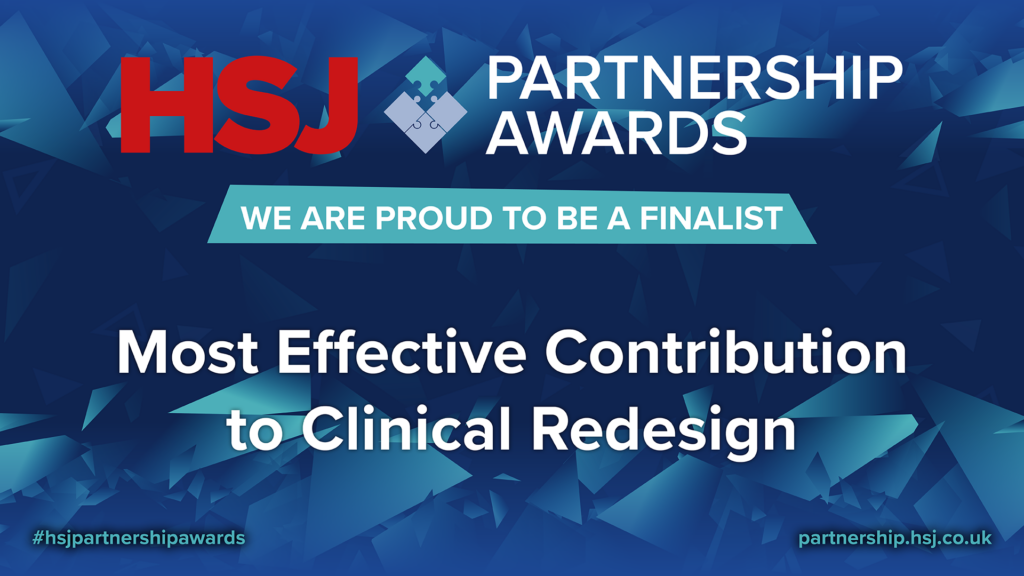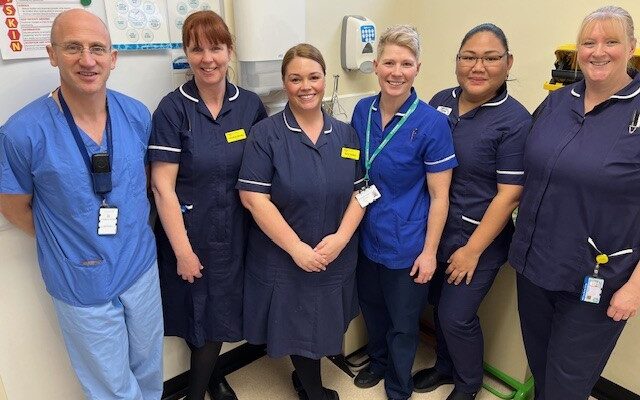An innovative collaboration between urological experts at Newcastle’s Freeman Hospital and B Braun Medical has led to the introduction of a new specialist nurse-led Nephrostomy Service transforming the experience for patients following a nephrostomy insertion.
Over a period of four years (including the COVID-19 pandemic) the new service has achieved:
- a huge reduction in hospital readmissions by over 40%,
- improved clinical outcomes and safety for patients, and
- enhanced knowledge, skills and confidence for staff.
These results demonstrate major improvements in patient outcomes, treatment pathways and experiences leading to the new nurse-led service being shortlisted for the HSJ Partnership’s ‘Most Effective Contribution to Clinical Redesign’ Award.

Nephrostomies
Nephrostomy procedures become necessary when the ureter from the bladder to kidney is obstructed by a stone, blood clot, tumour or infection. This involves the insertion of a thin flexible catheter tube which allows urine drain from the kidney.
Home to the region’s urological centre, the Freeman Hospital sees patients from all over the North East and North Cumbria carrying out around 300 nephrostomies each year.
Whilst a relatively safe and straight forward procedure, there are known post procedural complications as well as ongoing care needs. These all need specialist attention but can be managed with the right knowledge, skillset and support.
The challenge
Over time it became clear that care and support for nephrostomy patients following discharge was variable often resulting in readmission to hospital. Newcastle’s matron for urology at the time, Sally Ridley highlighted the need to review the entire pathway and instigated an overarching joint review involving urological specialist nurses in collaboration with B Braun Medical.
Newcastle’s urology teams have worked collaboratively with B Braun Medical since 2019, reviewing and developing pathways and service offerings with the aim of preventing harm, improving outcomes and enhancing the patient experience.
Sally explains: “After identifying the need for greater support for nephrostomy patients following discharge we decided to take advantage of our partnership with B Braun Medical tapping into their system knowledge and expertise, working with three of our clinical nurse specialists.
“We set up a quality improvement project with a view to completely overhauling our patients’ journey and providing a gold standard service.”
Rising demand
Kayleigh Brownlee-Moore, clinical nurse specialist in urology and B Braun’s Northern Regional lead nurse coordinated the project. She explained: “Due to rising numbers of patients with obstructive uropathy including metastatic cancer, we have seen an increasing need for nephrostomies.
“For those living with a terminal diagnosis a nephrostomy is a lifeline; enhancing their renal function and giving them a better quality of life with their loved ones. So it’s essential that we get their nephrostomy aftercare right.”
Following their procedure patients are discharged back to their place of residence for community-based care. However, from patient and family feedback, and reviewing hospital readmission rates it became evident that the quality of aftercare was inconsistent and at times sub-optimal.
“Unfortunately this is not uncommon,” continued Kayleigh. “Nephrostomy aftercare can vary nationally in part to incompatible or variable equipment and kit being provided by different suppliers.
“However we also found that staff simply didn’t have the right skillset or knowledge to provide the specialist care needed following a nephrostomy. This meant they didn’t feel confident to manage their patients’ needs safely.
It was crucial to review the entire pathway from start to finish so that we could bring about change and ensure every single nephrostomy patient would receive high-quality consistent aftercare.
Kayleigh Brownlee-Moore, clinical nurse specialist in urology
A new approach
Kayleigh’s role was dedicated to coordinating the new approach alongside her colleagues. Initially (pre-COVID-19) she saw all new nephrostomy patients supporting them as they returned home. She was able to observe all steps involved and where to introduce new improved measures.
These included delivering a comprehensive training programme on nephrostomy management to community and care home nursing staff giving them the competence and confidence to treat current and future patients.
Throughout (and beyond) the pandemic these visits were changed to telephone where possible, ensuring each new patient was contacted and introduced to the service and provided with contact details. Sometimes it’s just enough for the patients to have a dedicated point of contact. Face to face visits and training is still provided where required.
She also introduced a new nephrostomy hospital-to-home pack including easy to understand patient information.
Statistical review
Hospital Episodes Statistics (HES) data was analysed for the time periods of October 2018 – September 2019 (12 months preceding the new service) and October 2022 – September 2023, after its introduction.
During the 2018-19 period approximately 80 patients were readmitted within 90 days of their initial nephrostomy procedure.
During the latter period this had reduced to 40 patients returning to urology care at the Freeman Hospital reflecting a huge reduction in post-discharge complications.
Staff survey results
The team also surveyed both community and hospital-based urology staff on their perception of the new service using a 5 point Likert scale.
Community based staff said they feel upskilled and confident to manage patients once discharged home and even carry out relatively straight forward procedures such as nephrostomy flushes to clear minor obstructions in the knowledge that they can access more support if needed.
Hospital staff reported having more confidence when discharging patients and in particular that patients have the right equipment, with direct access to a clinical nurse specialist.
The nephrostomy service is extremely well regarded by staff in the urology department who can see how it has resulted in higher quality care for their patients.
I have found the nephrostomy service invaluable.
Urology ward sister
One of the urology ward sisters said: “We discharge patients with nephrostomy tubes both as a temporary or permanent measure for different reasons including management of stone disease or progressive prostate and bladder cancers.
“Dealing with such a significant lifestyle change can be overwhelming to patients and their families. Although they receive teaching on the ward at the point of discharge it can often be a cause for concern on whether they will manage and what to do if complications arise.
“Having the nephrostomy service is reassuring to the patient and their families and also to ward staff who know they will be followed up by an expert in the field. this alleviates any worries we may have on how they will cope in the community.
“The service also provides additional training to community nurses who benefit from knowledge around their function and purpose and also understanding of measures that can be taken in the community when complications arise such as how to flush the tubes.
“It has proved successful in the transfer of complex patients to new or existing care homes by providing teaching and support to the nursing teams there so they do not struggle.
“I believe the second benefit is less re-admissions to hospital for things that could be managed in the community. The referral system is uncomplicated. All patients are followed up promptly and supply of equipment is also managed releasing this burden from both ward and community staff.
“Overall an extremely worthwhile service managed very effectively by nurse specialist Kayleigh Brownlee-Moore who is always empathetic, approachable and available to ward and community staff and of course her patients.”
Transformational
So far Newcastle’s transformation project has not been replicated elsewhere in the country however the team hopes that sharing the success of the new service through the HSJ Partnership Awards will inspire similar collaborative service redesign in other NHS organisations.
Kayleigh says “It’s a real honour to have been shortlisted and to have our work recognised. The whole experience has shown the power of successful connections – having the right people in the right place at the right time.
“I’d love to see our approach rolled out across the country. We’ve already been contacted by colleagues from other Trusts asking about our experience. It would be a dream come true to see our efforts leading to standardised nephrostomy care across the country.”
Of Kayleigh’s achievement, Sally said: “It is fantastic to see the impact of this collaborative approach to care on patient and staff experience.
“I am incredibly proud of the team and what they have achieved.
This service really is true partnership working at its best, with an absolute commitment by all parties to get this right for patients.
Sally Ridley, head of nursing for surgical and associated specialties (Freeman Hospital)

Powerful benefits for patients
Executive Director of Nursing Ian Joy added: “I’m delighted to see our specialist urological nurses recognised nationally for the fantastic results of their new nurse led service, resulting in really powerful benefits for patients.
“This is what collaborative working is all about, harnessing collective expertise and commitment to bring about real change in terms of clinical effectiveness, patient safety and improvements in care.
“I wish the team all the very best at the awards ceremony.”
Health Service Journal (HSJ) Partnership Awards 2024
This year’s HSJ Partnership Awards will take place on Thursday 21 March 2024 celebrating collaboration and partnership working success stories as a platform to shape the future of our new integrated health and care system.
Most Effective Contribution to Clinical Redesign Category
Judges will be looking for a successful collaboration between the NHS and a business which can demonstrate tangible transformation in the approach to treatment with new systems, processes and training with evidence showing improved efficiency, capacity and patient outcomes.
We wish Kayleigh and the team lots of luck at the ceremony.
